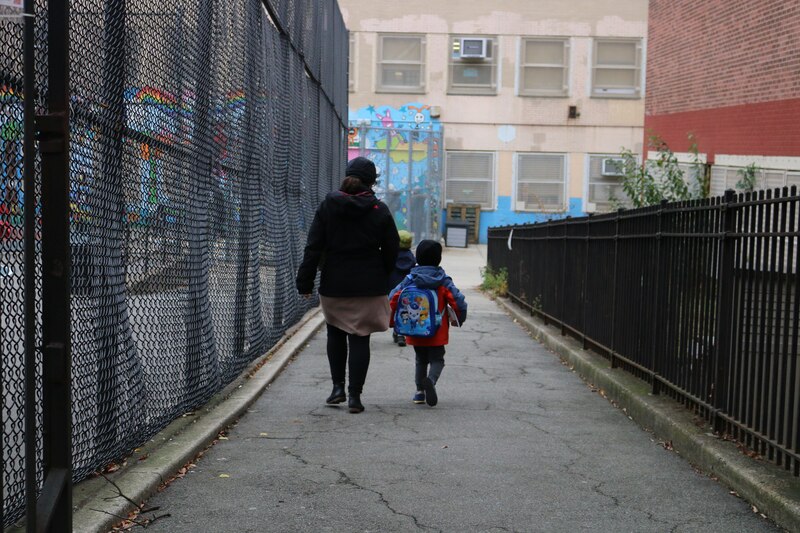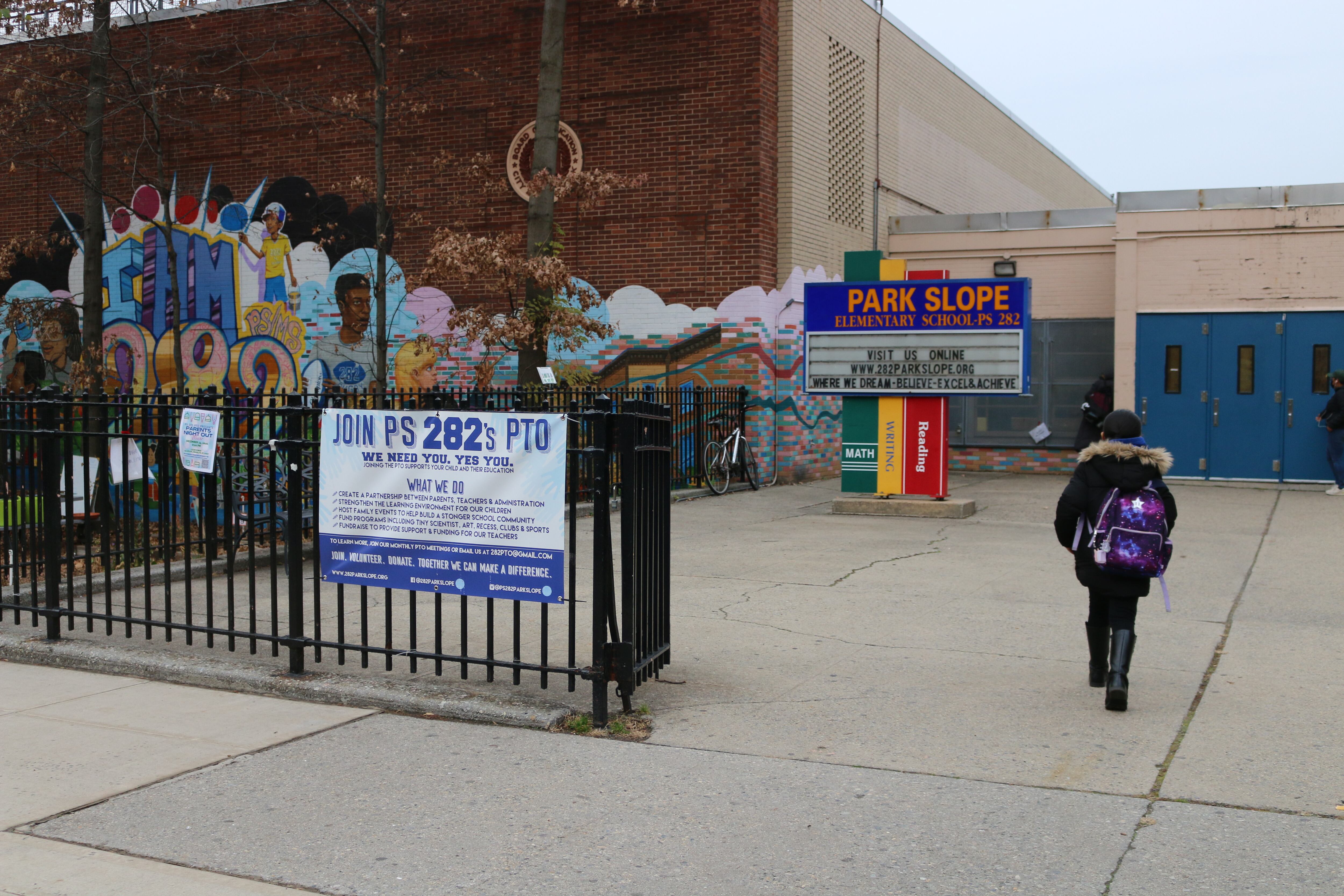Julie Hollar notices something unsettling in the mornings when students line up to enter P.S. 282 in Park Slope, Brooklyn.
In some of the lines, almost all of the children are white. Those are the “gifted and talented” classes.
Most of the students heading to general education classrooms, meanwhile, are Black or Latino.
“I worry about the message we’re sending to kids,” said Hollar, a mother of two white children in the general education program at P.S. 282. “They see that the kids in the class that’s called ‘gifted and talented’ are white, and the other kids are not.”
Mayor Bill de Blasio caused a firestorm with a recent proposal to phase out the city’s current gifted programs amid long-standing criticism that the classes, though coveted by many, segregate students.
“It’s about all students in the school and all teachers in the school.”
Well before the mayor’s announcement, school leaders, parent advocates, and education department officials in District 13, where P.S. 282 is located, had been laying the groundwork for reforms of their own. Some in the district are hoping to implement the globally recognized International Baccalaureate program, not only as a more inclusive alternative to gifted classes but also to help improve struggling schools. If they’re successful, the district — which spans from Brooklyn Heights to Fort Greene, Prospect Heights, and Clinton Hill — could provide lessons for a city locked in a bitter battle over the future of gifted education.
“In terms of building a district more equitably, and building a district with a common set of expectations, this is our goal,” said District 13 Superintendent Kamar Samuels. “It’s about all students in the school and all teachers in the school.”
Segregated, but impervious to reform
While most New York City kindergartners are Black or Latino, they make up only 14% of enrollment in gifted programs. Meanwhile, 70% of seats go to Asian American and white students, who make up less than a third of enrollment citywide. Also starkly underrepresented are students who come from low-income families, are homeless, have disabilities, or are learning English as a new language.
Most enter the gifted program in kindergarten. Admission is based on the results of a single test taken when students are about 4-years-old. Once enrolled, they can stay for the rest of elementary school.
Many academics, educators, and parents agree the city’s program has major flaws, including the competitive admissions process and limited number of seats available — only about 2,500 for some 65,000 kindergartners each year.
But it has been largely impervious to reform, seen as a way to keep white, middle class families — and the resources they often bring — in public schools. Many immigrant families, particularly those who are Asian, rely on gifted programs as a ticket to higher-performing schools.
After resisting calls to overhaul gifted for most of his tenure, de Blasio in October proposed phasing out the current program and replacing it with a vaguely defined plan called Brilliant NYC. Among the few details provided by the education department are that all kindergartners would receive “accelerated” learning. Training would be provided for teachers. The program would scale up a grade each year, with universal screening in third grade to determine whether students continue to receive some sort of specialized instruction.
The proposal has been met with intense backlash and skepticism that it will meet the needs of advanced learners.
The week after de Blasio announced it, Samuels, the District 13 superintendent, met with parents to discuss the district’s own plans, already in the works, to phase out gifted programs.
A diverse but segregated district
District 13 is a diverse corner of Brooklyn, including the gentrifying, historically Black neighborhood of Bedford Stuyvesant, historic brownstones in Brooklyn Heights, and clusters of public housing including the Farragut Houses in Vinegar Hill.
For years, parent leaders and educators there have been laying the groundwork for change. The district was thrust into the spotlight in 2016 during a bitter elementary school rezoning that shifted attendance boundaries around P.S. 8, an overcrowded, mostly white school in Brooklyn Heights, and Vinegar Hill’s P.S. 307, which enrolled mostly Black and Latino students with room to spare. New York Times journalist Nikole Hannah-Jones elevated the issue nationally when she wrote about it in personal and frank terms: Her daughter attended P.S. 307.
Since then, the local Community Education Council, or CEC — a volunteer parent board that approves zoning changes — has continued to wrestle with segregation within its boundaries. The district has landed state and city grants to come up with plans to spur more diverse schools. That work has continued throughout the pandemic with town hall style meetings on race and equity. Other parents in the district have taken their own actions. At P.S. 9, for example, the school community recently decided to end its gifted program.
Forging a new path forward has been full of competing problems and viewpoints. While selective programs, such as gifted, are seen as shutting out Black and Latino students, CEC member Cynthia McKnight said that many of the district’s parents of color were skeptical of outright eliminating them. In fact, she said, the area’s middle-class families of color, many from the Caribbean, have flocked to “screened” schools, or those with competitive admissions criteria.
District leaders also had to confront the fact that many parents were opting out of local schools. Three elementary schools in District 13 have been identified by the state as low performing, according to the superintendent. McKnight said that enrollment has been such a struggle at some, she’s surprised they haven’t been closed.
“We have to elevate everyone.”
Eliminating programs, even segregated ones, did not change “how the DOE is failing to educate our Black and brown children,” she added, using an acronym for the Department of Education.
“We don’t agree with the gifted and talented right now, testing 4-year-olds. But that doesn’t mean that we don’t value rigor and accelerated learning. We do,” McKnight said. “That’s why we pushed back.”
She said Samuels, the superintendent, listened. Using some of its grant money, the district applied for eight elementary schools and four middle schools to become International Baccalaureate schools, a program that has lured some local families to other schools in neighboring districts.
“They came hard at him, and he was like, ‘I can’t just take away and not give,’” McKnight said. “We have to elevate everyone.”
Like the name suggests, IB is a program recognized around the world that emphasizes teaching skills that students use in self-directed, project-based work and sometimes includes a foreign language component. It requires an intensive, multi-year accreditation process for the schools and specific training for teachers. Unlike the gifted programs, which operate as separate classrooms in the building, IB can be implemented school-wide in the younger grades.

Not ‘just for some schools’
As a potential replacement for the gifted program, IB may hold some specific advantages. Unlike de Blasio’s plan, it’s an established program that doesn’t need to be built from the ground up — something that lends itself to recognition. That may appeal to parents who value programs like gifted for their exclusivity.
Samuels hopes that will win over families and also bring more equal investments to school when it comes to improving teaching and learning.
“It means something for a teacher to be an IB teacher. It means you’ve gone through a process… and you’re really pushing the envelope as you think about all your students,” he said. “And I am of the opinion that it shouldn’t be just for some schools, and my district is of the opinion that this shouldn’t be just for some schools.”
Whether parents see the IB program as a viable alternative to gifted classes remains to be seen. Many have argued for separate classes to make sure the needs of advanced learners aren’t overlooked in a mixed-ability setting.
Eric Calvert, associate director of the Center for Talent Development at Northwestern University, said the IB program is “strong” and called himself “generally a fan.” But, he said: “It’s compatible with, but not a substitute for, a continuum of services for gifted and advanced learners.”
“The ‘fix’ can’t be to move from a status quo where only a privileged few gifted students get the education they need to one [with] no gifted students,” he wrote in an email. “In a more ideal world, IB curriculum would be used in the core curriculum, but there would still be opportunities for those students who are functioning multiple years above grade level to accelerate.”
Uncertain path forward
Any shift away from gifted programs isn’t likely to happen fast. The training and accreditation process for IB takes years, though schools have already started on that path. District and school leaders say they are planning for a series of parent meetings to explain the program and hear concerns.
What comes next is far from clear. District leaders had planned to have school leadership teams, made up of teachers and parents, vote on whether to remove their gifted programs. That was before de Blasio announced his plan to phase them out.
If the mayor’s plan sticks, no vote would be necessary. But de Blasio has just weeks left in office. He’ll be replaced on Jan.1 by Eric Adams, who, at least in the past, has offered a different view for gifted programs.
Incoming Schools Chancellor David Banks stressed that he’ll be focused on expanding sought-after programs like gifted, saying “parents are all, kind of, chasing after the handful of good programs that are out there.”
“Making sure that we integrate our schools will be a priority. But I will tell you, even above that, will be just building quality schools,” he said Friday during an interview on NY1.
With the future uncertain, Amy Rodriguez, the principal of P.S. 282, is moving ahead with the IB program. Her teachers have already received countless hours of training and are starting to implement some of the practices in classrooms. She hopes that as the school shifts to a new way of teaching, parents will conclude that gifted classes are no longer necessary.
“It won’t be seen as needed because every kid is getting a rich, exciting curriculum,” she said.






